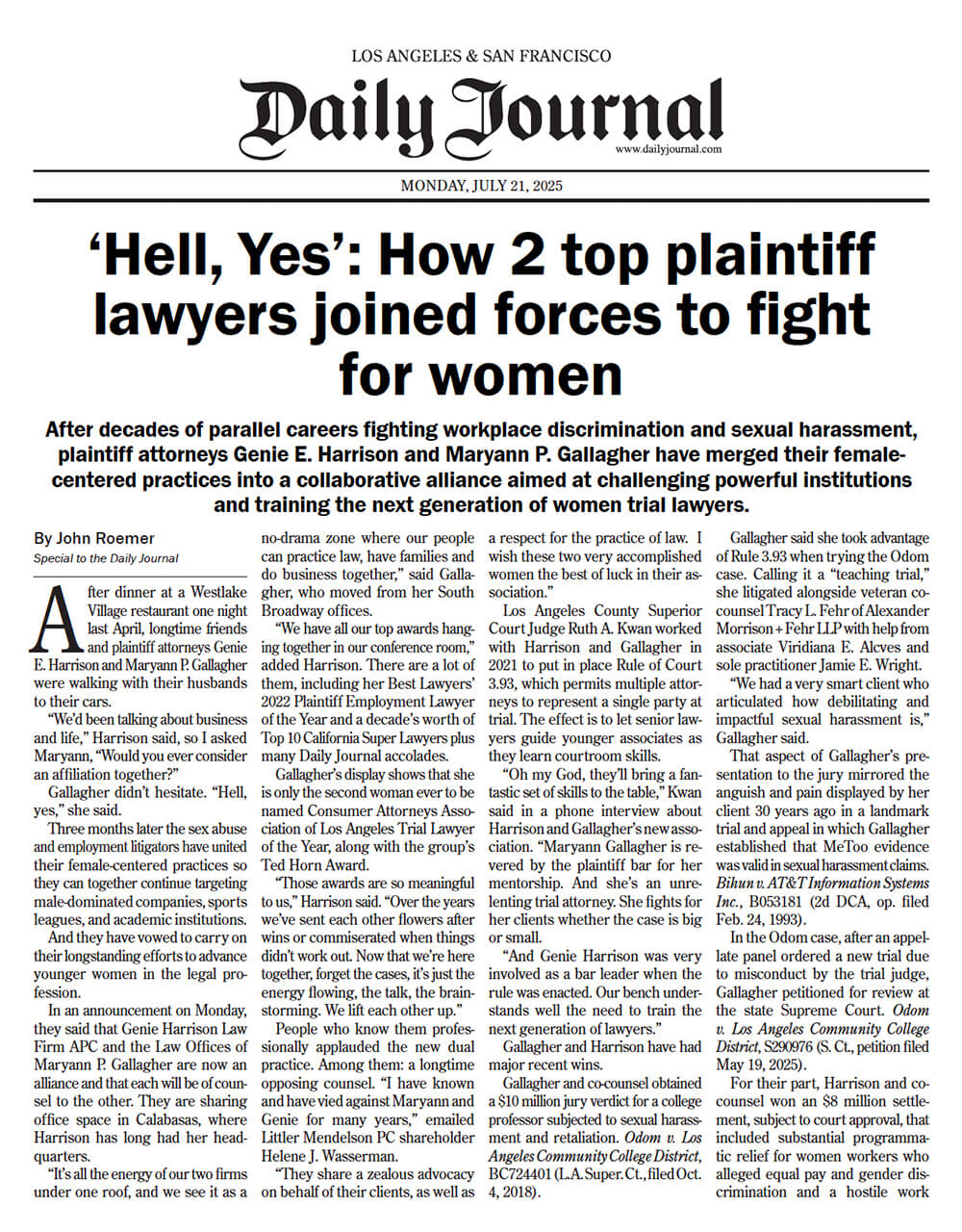Will a Biden Presidency Restore Victims’ Rights?
1/21/2021 — by Genie Harrison for Ms. Magazine
(Read the story below, or here at MsMagazine.com)
The incoming Biden-Harris administration has a long list of tasks to accomplish in order to make society fairer and safer for victims of assault, harassment and discrimination.
Numerous workplace protections were dealt a blow. Guidance on sexual harassment was removed from the EEOC website, reportedly due to disagreements over LGBTQ protections. The Obama-era Fair Pay and Safe Workplaces Executive Order, requiring federal contractor compliance with labor and civil rights laws, was repealed. Protections for transgender workers under Title VII of the Civil Rights Act of 1964 were taken away, and transgender people were barred from serving in the military.
To add insult to injury, after the summer’s George Floyd and Breonna Taylor protests the administration barred anti-discrimination trainings at federal agencies and contractors, calling them “divisive, anti-American propaganda.”
Other incursions included a rollback of Section 1557 nondiscrimination protections in the Affordable Care Act and of regulations protecting women, people of color and others from housing discrimination based on disparate impact. Across all life events, from buying a wedding cake to adopting a child, people asserting religious beliefs were virtually given carte blanche to discriminate.
This is the America into which the Biden administration—still viewed by 20 percent of the country as illegitimate—will be wading on Inauguration Day. What will Biden’s priorities be, how will he be able to accomplish them and—most importantly—what can we expect to see in the coming months and years?
Right off the bat, Biden has pledged to breathe new life into his signature legislative achievement, the Violence Against Women Act (VAWA).
Last year the House passed a bipartisan reboot of VAWA that includes protections against online abuse among other important safeguards, but the Senate version of the VAWA Reauthorization Act has been held up by Senate Majority Leader Mitch McConnell. With a different administration and perhaps a different Senate, VAWA may see new light. Even without its passage, victims of domestic violence should take comfort in knowing they will be heard and treated with dignity by this administration.
On campuses, changes to Title IX that have handicapped victims of sexual assault should be eased or reversed. Biden promised a “quick end” to the regulations, but those rules were enacted through a formal rulemaking process and must go through an equally lengthy process to be undone. Attorneys general from 18 states have sued to reverse the regulations, so Biden could put the rule on hold and draft a new rule to replace it. Even if the existing rules were upheld in court, Biden’s team could issue guidance to help schools work around them while pursuing more fundamental change. For victims of assault on campus, this guidance could help alleviate concerns about reporting misconduct.
For the LGBTQ community, change can‘t come soon enough. Biden has committed to achieving passage of HR 5, the Equality Act, in his first 100 days. The bill would extend to this vulnerable population the benefits of the civil rights law, barring discrimination in employment, housing, credit, education, public spaces and services, federally funded programs and jury service.
Even if HR 5 doesn’t become law, Biden can do a lot to remove barriers and ensure equal treatment for this group. He has explicitly committed to restoring Obama-era protections in all aspects of life by bringing those policies back into force and reaffirming that the Civil Rights Act extends to members of the LGTBQ community.
In the workplace, expect to see changes big and small. Biden, a strong proponent of unions and worker rights, will pursue legislation that improves working conditions and employee benefits. He has committed to seeing passage of the bipartisan Pregnant Workers Fairness Act, which requires employers with 15 or more employees to provide reasonable accommodations to workers based on pregnancy, childbirth or related medical conditions, requires them to work with employees seeking pregnancy accommodations and bars them from retaliating or otherwise interfering with a pregnant worker’s right to seek a reasonable accommodation.
Biden co-sponsored the Paycheck Fairness Act when it was introduced in 2007, he has promised to continue fighting for equal pay for women, and he is calling for federal agencies to collect and distribute wage gap data. Biden favors creating a negotiation skills training program for women and girls and supports legislation that makes it easier for women to organize unions. Through executive orders, he could ban employees from asking about an applicant’s salary history, which has historically been used to maintain lower pay for female workers. Importantly, Biden has also said he will strengthen the enforcement powers of the Equal Employment Opportunity Commission (EEOC) so the agency will be authorized to more aggressively pursue companies that engage in illegal practices.
One last big item: Now that the two Georgia Senate seats went to Democrats, a significant reform that should be enacted by Congress and signed into law by Biden is the Forced Arbitration Injustice Repeal Act (FAIR Act). Forced arbitration almost always favors the more powerful party—the employer, the manufacturer, the service provider—and it results in secret proceedings designed to keep the public from knowing about unlawful conduct adjudicated in those cases. Forced arbitration is the reason we didn’t know until it was too late about sexual harassment involving well-known perpetrators such as Harvey Weinstein and Jeffrey Epstein. This change, and the end to secret settlements, would make a world of difference for victims.
Given that Biden-Harris won the election by more than seven million popular votes and earned 306 electoral votes, they have a mandate—much of which came from minority women. The incoming administration will have a long list of tasks to accomplish in order to make society fairer for those women.
Luckily for all of us, the transition team is working to assemble an experienced, professional administration that knows how to get policies implemented.





